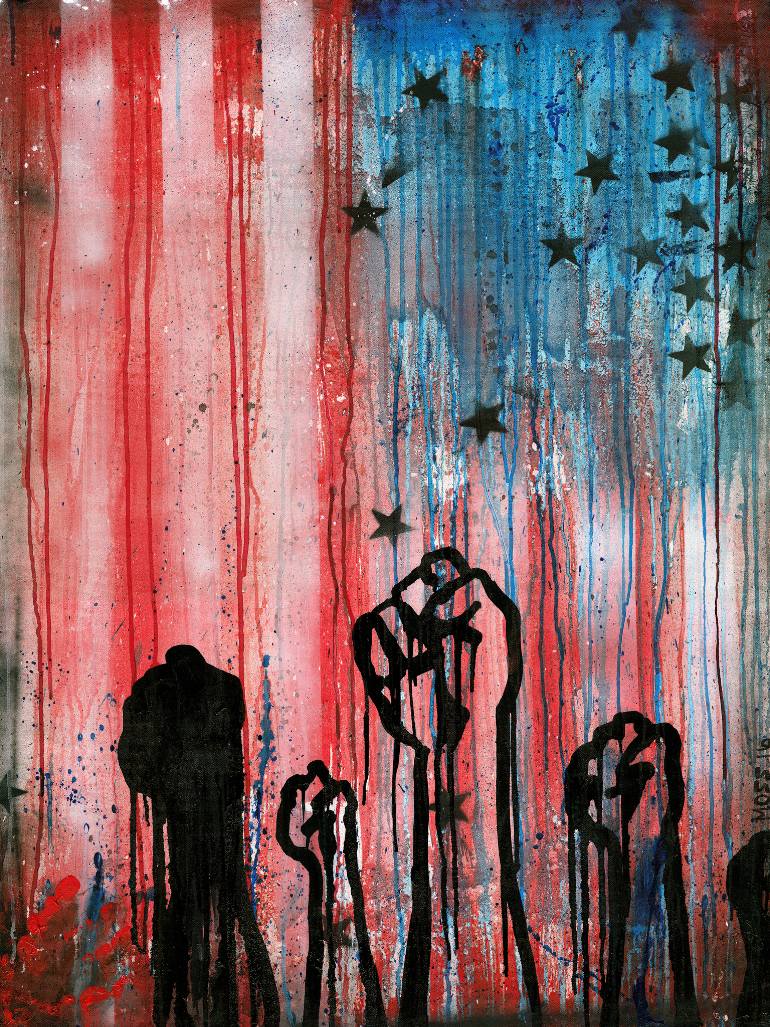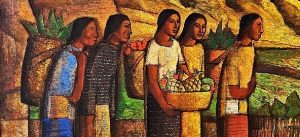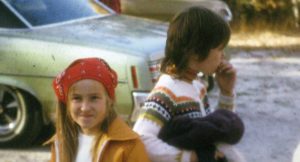A Song on the End of the World
by Czeslaw Milosz, translated by Anthony Milosz
On the day the world ends
A bee circles a clover,
A fisherman mends a glimmering net.
Happy porpoises jump in the sea,
By the rainspout young sparrows are playing
And the snake is gold-skinned as it should always be.
On the day the world ends
Women walk through the fields under their umbrellas,
A drunkard grows sleepy at the edge of a lawn,
Vegetable peddlers shout in the street
And a yellow-sailed boat comes nearer the island,
The voice of a violin lasts in the air
And leads into a starry night.
And those who expected lightning and thunder
Are disappointed.
And those who expected signs and archangels’ trumps
Do not believe it is happening now.
As long as the sun and the moon are above,
As long as the bumblebee visits a rose,
As long as rosy infants are born
No one believes it is happening now.
Only a white-haired old man, who would be a prophet
Yet is not a prophet, for he’s much too busy,
Repeats while he binds his tomatoes:
There will be no other end of the world,
There will be no other end of the world.
Warsaw, 1944
The slang term “stay woke” began in the African American community. Its popular usage can be traced to the 2008 Erykah Badu song “Master Teacher,” and in 2014, “stay woke” became the catch phrase for the Black Lives Matter movement in the wake of Michael Brown’s shooting in Ferguson, Missouri. It’s featured in Childish Gambino’s (aka Donald Glover) song “Redbone,” which is played in the racially charged thriller, Get Out. But over the last few years, “stay woke” has been appropriated by a larger population in the United States and it’s expanded its meaning beyond racial injustice to all social injustice. There’s even “staywoke.org,” dedicated to issues of immigration, disability rights, LGBTQ rights, gender rights, and educational justice – just to name a few.
“Stay woke” means to stay awake; stay watchful; notice what’s going on around you; become aware of the policies and politics and people who maintain inequity and injustice in our community. Then do something about it.
Today, our scripture is screaming at us to “stay woke.”
This is the first Sunday of Advent, the beginning of the new church year. We, as the church, follow a different calendar than the rest of the world, and as such we live in two different times. Never is this more evident than in Advent. The world tells us that Christmas is here. Stores have been advertising it since September. But Advent tells us to wait. Jesus is not yet come. We have four Sundays, four candles to light before Christmas is here. It’s the push-me, pull-me of the season, like Schrödinger cat: Christmas is here and not here at the same time.
The candle we light today as we begin the season of waiting and watching, is appropriately the candle of prophecy. Our scripture to begin our journey is not just prophetic, it is the apocalypse. Apocalypse is often misinterpreted as the end of the world, when in fact it means the end of our world. It means “the times, they are a-changing,” and in fact, have already changed.
Nothing was more true of changing times than in the communities to which Isaiah and Mark were speaking. In Isaiah, the people of Israel had just returned from their exile to find Solomon’s Temple still in the dirt where the Babylonians destroyed it fifty years earlier. They were home, but not really home. These were the descendant’s of the men, women, and children taken by Babylon. They had only stories of their homeland to guide them. The land to which they returned was not flowing with milk and honey like the stories suggested, and the people who remained in Israel during the exile were not particularly friendly toward the returning community. Israel may have been the promised land, but the promise had been broken and hope for it’s return was a long way off.
For Mark’s community, the promise was all but dead. At the time Mark wrote his gospel, Herod’s glorious temple, the one that replaced the replacement for Solomon’s temple, had just been razed to the ground by Rome, never to be rebuilt. The temple was the center of all Jewish and early Christian religious life, it symbolized the identity of the Jewish people, and Jesus taught there. It was the dwelling place of God. Its destruction was a cataclysm to the community – not only for the nation of Israel, but for everyone whose faith sprang from its existence. The temple’s loss was a theological catastrophe. If God’s house can be ransacked and wrecked, then God does not live there anymore.
So the question becomes, “Where is God?”
I would argue that these are apocalyptic times. The times have changed so quickly in the past year, it’s hard to tell where we will be next year, next month, or even next week. Every day there is a new revelation from Russia or a real threat from North Korea. Trust in our media, our leaders, and our democratic system is at an all-time low. Stars are falling all around us: Hollywood stars, media stars, sports stars, political stars. Our world, for better or for worse, in one way or another, has ended, and we find ourselves in a new and unfamiliar land. There will be no other end of the world.
Our scripture today is telling us – just as Isaiah told the Israelites and just as Mark told the early Christians – in the midst of all this change, we must stay woke.
We want God to wake us up. We long for God to rip open the skies, come down from heaven, and show everybody whose side he’s on. Because we’re betting God’s on our side. It’s tempting to equate power with God’s favor, to represent our own ideology as God’s own ideology and call it God’s word; and then use that word as God’s own to destroy our brothers and sisters. But as Anne Lamott is famous for saying, “You can safely assume you’ve created God in your own image when it turns out he hates all the same people you do.”
It’s on us to stay woke. It’s our responsibility to be awake and alert and aware of all that’s going on around us. Because, you see, if we aren’t watchful, we’ll miss seeing God.
When God comes, it’s not to vanquish our enemies. When God comes, God reveals what kind of people we really are. Isaiah says, “We have all become like one who is unclean, and all our righteous deeds are like a filthy cloth.” The term “unclean” here invokes a woman on her monthly cycle and the filthy cloth is her menstrual cloth. The cloth’s very existence is proof of no life inside of her.
What kind of people are we? Are we working to bring life to our communities, to our neighbors, to our brothers and sisters no matter who they are? Are we birthing peace, equity, justice, integrity, truth? Or do our deeds prove that the only life we care for is our own?
We have to stay woke to what’s happening all around us. We have to stay woke to police brutality against people of color. We have to stay woke to gender bias, sexual harassment, and misogyny. We have to stay woke to corporations gobbling up clean air, land, and water and our leaders who let them. We have to stay woke to inequities in housing, health care, jobs, and education – especially for people of color, women, and the impoverished.
And once we’re woke, we have to stay present. We have to live in this new reality if we are ever to change it for the better. We cannot effect real change if we choose to live in a “glorious” past or wait for a “pie-in-the-sky” future. The apocalypse is upon us and our world is ended. We have to act now.
Apocalyptic stories are not really about the catastrophe that changes our world or the circumstances in which we find ourselves. Apocalyptic stories are always about the presence of God in our catastrophe and the assurance of God’s love no matter what our circumstance.
When God comes, it’s not in the rending of the sky but the rending of a young girl who gives birth to the greatest power this world has ever known. That power does not stem from vanquishing enemies, but from loving our enemies because we are all children of God. The power of love bursts through every temple, every creed, every ideology, and even every theology – and it changes the world.
Where is God? When you see the destruction of all that we call holy, when you see the seismic shift in our culture so that you don’t recognize it any more, when you see war and desolation and refugees and deadly shootings – don’t close your eyes. Stay woke. If you look hard enough, you’ll find that God is nearby, working through ordinary people just like us to love our neighbor, heal the sick, feed the hungry, befriend the friendless, and include the stranger. Stay woke, because you don’t want to miss what God is doing through God’s people to bring life into a world of death and destruction.
That’s why this Sunday we don’t just light the candle of prophecy, we light the candle of hope – hope in Emmanuel, in God with us. We wait and we watch and we work, preparing a place in our communities and in our hearts for God to work. Staying woke means putting our trust in life, so much so that we are willing to stare into the eyes of death. It means staring down injustice, calling it by name, and tearing it down; because God doesn’t birth peace and justice in this world without us.
Amen.
This sermon was preached at The Hermitage on December 3, 2017. Scripture for the day was from Isaiah 64:1-9 and Mark 13:24-37.



Average Rating